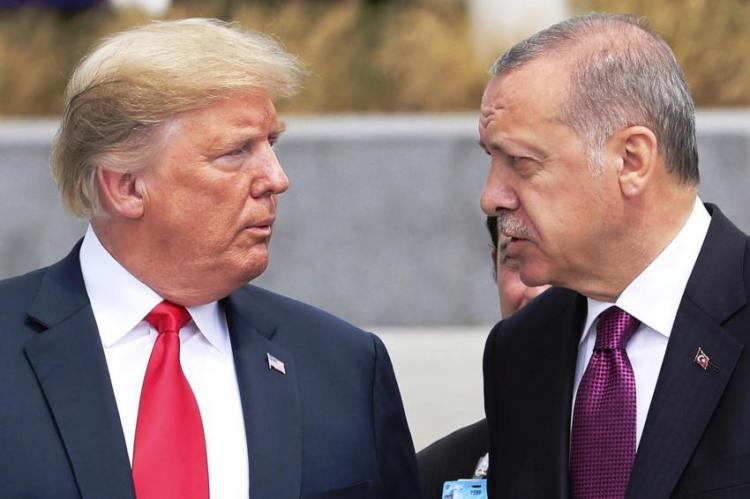Turkish threat to close Incirlik base didn t come out of the blue – Analyst
North-Press Agency
An expert on international affairs pointed out the Turkish threats to the United States to close its base in Turkey "did not come out of the blue", in light of many things that contributed to the tension in the relations between Turkey and the United States, including "the Turkish invasion of northeastern Syria.”
Masoud Maalouf, the former Lebanese ambassador to Canada, and an expert on the international affairs told North-Press that the Turkish threat to close the U.S. Air Force base "Incirlik" didn't come out of the blue. He pointed out that there are many things which contributed to the latest tension in the relations between the two countries since the days of the former President Barack Obama, on the backdrop of the failed coup attempt, then the issue of the Turkish-Russian rapprochement, and Turkey's purchase of S-400 missile system from Russia. Likewise, Turkey's rapprochement with Iran for decades, the "biggest enemy" of the United States, in addition to "the Turkish invasion of northeastern Syria, and the killing and displacing of thousands of Syrian-Kurds, the local allies of the United States.”
Turkish President Erdogan's visit to Washington, and his reception at the White House a month ago, and then his second meeting with President Trump at the sidelines of the NATO summit, two weeks ago, "didn't dissipate these differences and lack of mutual trust, as tension increased when the U.S. Congress issued what was known The recognition of the Armenian Genocide at the hands of Ottoman Turks in 1915, and this is what angered Erdogan,” according to the expert on international affairs.
The U.S. Congress had taken a decision to impose sanctions on Turkey after its invasion of northeastern Syria, and according to Maalouf, the possibilities are now available to implement this decision, in light of the Turkish threat now not to allow the Americans to continue using the Incirlik Air Base, which contains U.S. nuclear warheads, and also to close the Kurecik Base for radar systems, which is also used by the U.S. Air Forces.
The expert on the international affairs believes that taking such a decision by Turkey would make the relations worse between the two countries, because the United States is counting on this base in terms of protecting its allies in the NATO countries since its war on Iraq in 2003, especially those countries near the Russian borders, and also in terms of the possibility of the outbreak of an armed conflict with Iran.
Turkey relies on taking such an escalatory step that it won't lose much in its relations with NATO countries, considering that its relations are very cold since its purchase of the Russian missiles, as "NATO countries consider that, the entry of Russian technology into one of NATO countries would expose the technology of the Western Air Forces to be penetrated by Russia,” according to Maalouf.
He explained that despite the existing differences between Turkey and the United States, the U.S. still needs Turkey, whether in relation to its strategic geographical location near Russia, Syria, Iraq and Iran, or with regard to Turkey's capabilities to stop the waves of displaced people and refugees from Asia and Syria towards Europe.
He also pointed out that, "Turkey depends on the strength of its threat to close the Incirlik base, on its new rapprochement with Russia, which has become an economic and military matter in the Middle East, especially after it secured air, land and naval military bases in Syria.” Maalouf stressed that, "From this standpoint on which Turkey is based, President Trump may find himself forced to freeze the implementation of sanctions on Turkey to avoid more tension with it, and to stop its rapprochement with Russia.”
"However, if the Congress finds it appropriate, it can bypass President Trump and impose the sanctions because it has an overwhelming majority in favor of that.”
The former Lebanese ambassador to Canada clarified that, "the subject now depends on the possibility of negotiations between the two countries that reduce tensions between them, knowing that Turkey has confirmed its desire not to back away from the Russian missile deal, as it has threatened to issue a decision by the Turkish parliament that recognizes the genocide of the indigenous people on the American soil known as the Red Indians, in response to the decision of the U.S. Congress to recognize the Armenian Genocide.”
According to the expert's opinion, "Turkey may resort to repositioning itself geopolitically, as it strengthens its rapprochement with Russia and Iran, which leads to the formation of a strong military and economic bloc in exchange for the United States, which appears to be gradually withdrawn from the region in implementation of Trump's policy, which is titled (America First) and which won with a presidency on the basis of it in 2016 and seeks to promote it again in the next elections at the end of next year.
Masoud Maalouf, the former Lebanese ambassador to Canada, and an expert on international affairs concluded his statement to North-Press, saying: "The matter now depends on the American side that who will win the next presidential elections, and which party will have the majority in the Congress. On the Turkish side, it depends on Erdogan and his party's continuation in leading Turkey or on some changes which may take place at the level of the Turkish presidency.”

